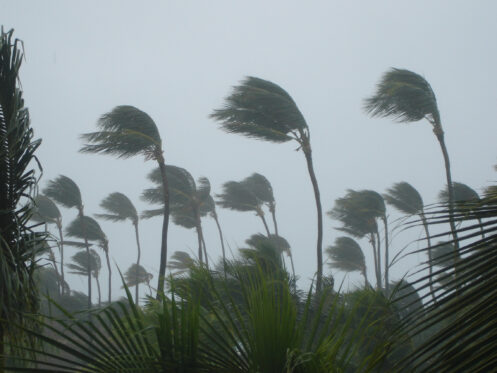When storms roll through Cape Coral, your plumbing system takes on more than its fair share of stress. At Plumbing, Cooling & Electrical Nerds, we want to help you stay ahead of the weather and avoid costly water damage. With a few proactive steps, you can protect your home, your peace of mind—and your wallet.
Start with Your Drainage System
Good drainage is your first line of defense. When water can’t flow away from your home, it starts causing trouble—like foundation damage or basement flooding. Let’s break down what you should be looking at.
Check Your Indoor Drains
Take a walk around and inspect your sinks, tubs, and floor drains. If any of them are draining slowly, there might be a clog. Enzymatic drain cleaners are usually safe, but they’re not always effective. Skip the harsh chemicals and call our team instead—we’ll clear it up with professional snaking or hydrojetting.
Don’t Forget the Basement
Basement drains are often out of sight, out of mind—until they’re not working. If there’s standing water or slow drainage, we can use hydrojetting to safely clear it out and restore proper flow.
Make Sure Your Sump Pump Is Storm-Ready
A sump pump is a must-have in Cape Coral homes, especially during hurricane season. It kicks in automatically to move water out of your basement, but only if it’s working properly.
Do a Quick Water Test
Pour a bucket of water into the sump pit. If the pump doesn’t turn on and remove the water, it’s time for a professional inspection.
Add a Battery Backup
When the power goes out, your sump pump stops—unless it has a battery backup. We highly recommend installing one so you’re covered even during outages.
Check the Discharge Pipe
The discharge pipe sends water away from your home. If it’s blocked or frozen, water can back up and flood your basement. We’ll make sure it’s draining properly and flush it if needed.
Keep It Clean
We suggest cleaning your sump pump at least once a year. If it runs often, check it every few months. Dirt, debris, and sediment can build up and cause clogs, so cleaning the screen, basin, impeller, and check valve makes a big difference.
Consider a Backup Pump
A second sump pump is great peace of mind. If the first one fails or can’t keep up, the backup will take over and keep your basement dry.
Prevent Sewer Backups Before They Start
When the city’s sewer system gets overwhelmed by rain, it can push sewage right back into your home. Not fun. Here’s how to prevent that nasty surprise.
Get a Sewer Line Camera Inspection
We can take a look inside your sewer line with a camera to check for tree roots, cracks, clogs, or collapsed sections. It’s a great idea to do this once a year—especially before storm season hits.
Install a Backwater Valve
If your home was built before the 1980s, it might not have a backwater valve. This simple device stops sewage from flowing into your house during floods. If you already have one, make sure it’s inspected yearly. If not, we can install one for you.
Be Smart About What Goes Down the Drain
Flushable wipes, grease, paper towels, and other debris can clog your sewer line fast. Keep it clean and only flush the basics—especially when you know storms are coming.
Clear the Sewer Cleanout
Hearing gurgling noises or noticing slow drains? It might be time for a sewer cleanout. Our hydrojetting service uses high-powered water to blast through blockages. For homes with recurring issues, we often recommend doing this every one to three years—depending on usage.
Inspect Plumbing Connections for Leaks
Stormwater can sneak in through weak plumbing connections. A quick inspection every year or two can help you catch problems before they escalate.
Watch for Leak Warning Signs
Here’s what to look out for:
- Spikes in your water bill
- Low water pressure
- Musty smells or visible mold
- Water stains on walls or ceilings
- Wet spots on floors or in the yard
- Foundation cracks
If you notice any of these, don’t wait—it’s always easier (and cheaper) to fix a small leak than deal with water damage later.
Seal Basement Wall Penetrations
Anywhere a pipe enters your home through the wall should be sealed. Use waterproof caulk or a plumbing-grade sealant—skip the expanding foam, which might not hold up long-term. Check these spots twice a year to make sure they’re still sealed tight.
Insulate Exposed Pipes
Even in Florida, temperature shifts and moisture can put stress on your pipes. Wrapping them with insulation helps prevent cracks and keeps them in better shape year-round.
Protect Your Water Heater and Fixtures
Floodwaters don’t mix well with plumbing equipment. A little preparation can go a long way in protecting your home’s most essential fixtures.
Elevate Your Water Heater
Put your tank water heater on a raised platform to keep it out of standing water. It’s a simple step that can prevent major issues, especially with gas-powered models. Also, ask us about our tankless water heater installation, and we can install it on the wall.
Double-Check Appliance Connections
Take a moment to check hoses and connections on things like washing machines and dishwashers. If anything seems loose or worn, we can replace it before it becomes a leak.
Know Where Your Shut-Off Valve Is
If a pipe bursts or you spring a major leak, you’ll need to shut off the water fast. Make sure you and your family know exactly where that main shut-off valve is.
Maintain Your Septic System (If You Have One)
Not every home in Cape Coral is on the city sewer system. If you have a septic tank, keep it in top shape to avoid backups when the ground gets saturated.
Regular Pumping
Most tanks need pumping every three to five years, depending on how many people are in the home. If your tank’s overdue, heavy rain could push it past its limit.
Drain Field Checks
Look for signs like puddles, slow drains, or strong odors in your yard. These are red flags that your system might need attention.
Let’s Get Your Plumbing Ready
Rainy season isn’t something we can control—but how your home handles it is. Staying ahead with inspections and preventative maintenance helps you avoid the stress of surprise plumbing issues. If you do have immediate plumbing issues, turn to us for emergency plumbing services.
At Plumbing, Cooling & Electrical Nerds, we’re here to help you prep your plumbing for whatever the forecast throws your way. From sump pumps and sewer lines to leaks and drain clogs, we’ve got you covered—and we stand behind our work 100%.
Give us a call today to schedule your plumbing inspection or ask us how to get your home storm-ready!

